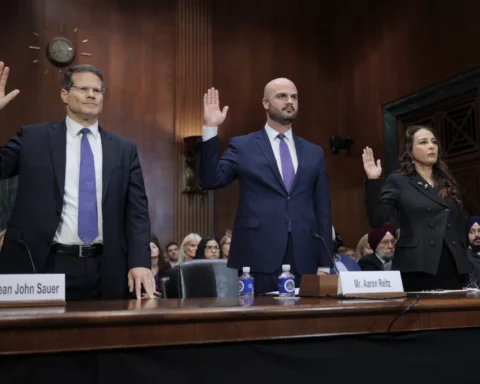Rep. Ayanna Pressley will reintroduce H.R. 40, federal legislation to study reparations for slavery, on Wednesday as the Trump administration leads a wide-scale rollback of diversity, equity and inclusion efforts in the federal government.
The bill, which had 130 co-sponsors in the last session, is not likely to advance under the Republican-controlled Congress, and the White House has previously been opposed to any reparations efforts.
“We find ourselves in a moment of emboldened white supremacy and anti-Black racism, and a weaponized Supreme Court that is actively gutting protections and progress that has been made,” Pressley, D-Mass., said in an exclusive interview.
She described the country as being at “a painful inflection point.” She added, “We have a hostile administration working actively to roll back decades of progress and more recent progress when it comes to our civil rights.”
Last month, President Donald Trump issued an executive order banning DEI policies in federal agencies, calling them illegal and discriminatory, leading to federal workers being placed on leave and emboldening some of America’s largest companies to walk back corporate equity promises.
Despite the roadblocks, Pressley said it’s critical to keep pushing H.R. 40.
“I’m working actively to blunt the assaults from a hostile administration that means harm to everyone that calls this country home, but will have a disparate impact on Black Americans,” Pressley said, “because throughout history, it has been proven that when other folks catch a cold, Black folks, figuratively, catch pneumonia.”
H.R. 40 has been introduced continually over the past three decades, and Pressley is officially taking over from Rep. Sheila Jackson Lee, D-Texas, who died last summer from cancer. Lee’s daughter, Erica Lee Carter, who completed the remainder of Lee’s term, approached Pressley about taking over the bill.
The bill’s content has not changed since it was introduced in the last session, Pressley’s office confirmed. It would create a commission to study and propose reparations for slavery and subsequent racial discrimination. Rep. John Conyers, D-Mich., first introduced it in 1989, and Lee took over when he retired in 2017.
After the end of the Civil War, Gen. William T. Sherman asked a group of Black leaders in Savannah, Georgia, how the approximately 4 million newly emancipated Black people could best be supported. They proposed issuing 40 acres and a mule.
The fact that “40 acres and a mule” was never provided is seen by reparations advocates as an unfulfilled federal promise.
“Our government, regardless of who occupies the Oval Office, has a moral and legal obligation to provide reparations for the enslavement of Africans and its lasting harm on Black communities,” Pressley said.
After emancipation, reparations were self-organized through grassroots organizations such as the Ex-Slave Mutual Relief, Bounty, and Pension Association and federal agencies such as the Freedmen’s Bureau, yet neither lasted long. After the period of Reconstruction, Jim Crow laws across the country facilitated the continuation of racial discrimination and segregation.
Reparations advocates often point to the racial wealth gap as evidence of slavery’s continued effects. The median wealth of white households in the U.S. is $250,400, more than nine times as much as that of Black households, which is $27,100.
H.R. 40 left the House Judiciary Committee for the first time in 2021, after a movement spurred by the murder of George Floyd in 2020. Cities and states have been increasingly considering reparations efforts, with California passing the first state reparations package in the country last fall.
As the lead sponsor in the House, Pressley will be in charge of convincing fellow legislators that reparations remain urgent and should be a priority. Sen. Cory Booker, D-N.J., introduced the Senate equivalent last month.
“We’ll be advocating for support on and off of the Hill,” Pressley said. “There’s always been a large movement and coalition around H.R. 40.”
In 2021, 77% of Black Americans said they supported issuing reparations tied to slavery, while only 18% of white Americans agreed, according to the Pew Research Center.
When asked about federal reparations in a 2019 interview with The Hill, Trump said, “I don’t see it happening.”
The White House has not responded to a request for comment about the bill.
“We are in undeniably challenging times now,” civil rights attorney and reparations advocate Nkechi Taifa said. “It is absolutely essential that H.R. 40 remain our North Star.”
Taifa hosts a monthly meetup for reparations organizers and runs public educational events. “We are standing strong in the fight for reparations, regardless of whether this is a time of political turmoil or not,” she said.
National reparations organizer Dreisen Heath said Pressley was the right lawmaker to continue pushing the bill because “she actively marries intersectional issues and is unapologetic about it.”
Pressley has been involved in introducing legislation around baby bonds, which are government-managed trust funds to address the racial wealth gap; criminal justice reform; and other racial equity matters as a congresswoman.
“I love doing the work of consensus building,” Pressley said. “I think I will breathe a new iteration of life into this movement.”
“I hope it will mean something to Black Americans,” she said about the continued significance of H.R. 40, “and I hope that it will mean something to people of conscience, who care about the work of truth and reconciliation and healing.”







